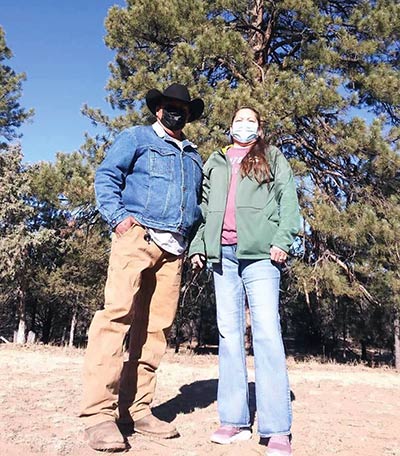
Trial volunteer No. 1 ‘ecstatic’ over Pfizer vaccine rollout
CRYSTAL, N.M.
Arvena Peshlakai, the first trial volunteer on Navajo to receive the Pfizer COVID-19 vaccine shot in September, says she and her husband, Melvin Luke Peshlakai, had no hesitation about signing up for study being conducted by Johns Hopkins at the Chinle Comprehensive Health Care Facility.
“We were hoping a vaccine would come out because of all of the deaths that were occurring,” said Arvena. “We wanted to see something happen. We automatically said, ‘Sign us up, we’re ready!’”

SUBMITTED
Melvin and Arvena Peshlakai were among the first Navajos to volunteer for the Pfizer/BioNtech vaccine trial last fall. The Peshlakais said they trust the study and are “ecstatic” that the vaccine has been approved for emergency use.
Arvena shared that the team that administers the Pfizer trial went to great lengths to explain to her and her husband how it would work, and that one of them would get the placebo and the other would get the vaccine. “They really made us feel comfortable,” she said. “I trust the physician, I trust the team, I trust John Hopkins and thought, ‘I’m good with this,’ because they provided me all of the details and information I needed to feel secure.”
Now that the Pfizer vaccine has been approved by the FDA and distribution has begun on Navajo, Arvena said she is “ecstatic and grateful.”
“We’re excited that it’s been approved and we finally have a vaccine, especially at 95 percent effectiveness,” she said. “We’re thankful to the Trump administration for Operation Warp Speed and John Hopkins for the trial vaccine program for Natives.”
Melvin, a disabled combat veteran, said he’s grateful to all of the people who volunteered for the trial who had the courage to make the sacrifice for a chance to make things better for the whole world. “I want the Navajos to understand that the only way we can win is we can’t be scared to lose,” he said.
“The government is working to help us. They want everyone to take it for free. That’s good, so we should do it.”
After receiving the shot, the Peshlakais were required to keep a daily diary on a phone app where they reported any symptoms. Arvena said she had some mild side effects, including muscle aches, a slight fever, and soreness at the injection site, but those subsided quickly.
Melvin had no side effects. Their second vaccine was administered 28 days later and the duration of the study will continue for two years. One of the reasons for that is to determine how long the immunity to COVID-19 lasts.
“I feel we all should step up and help to find the right vaccination for Native people,” said Arvena. “We’re a great nation, a big nation, and we should be able to do this and try to help out as much as we can because this thing (COVID-19) is no joke. It’s killing people.”
Arvena said in the meantime they’ve received a lot of support from family and colleagues. Her daughter, Quortnii Francis, and her husband Kyle Laughing also joined the trial.
Francis reported no symptoms and Laughing had moderate muscle aches and soreness in his arm. Francis said for her the risks of getting COVID-19 far outweighed the risk of any side effects from participating in the trial, and she was motivated to help others, including her family.
“I realized how severe and dangerous the illness was,” she said. “I really just wanted my parents and myself and my husband to be safe. I thought, ‘We just have to take one for the team.’”
She encourages those who are afraid of taking the vaccine to do their own research. “You’ll be fine,” said Francis. “If you really look into it, you’ll understand a lot of nurses and doctors and people who make medicines are saying it’s OK.” Arvena said that her family’s ethic to help out comes from her parents and grandparents, uncles and aunts.
“I was very blessed,” she said. “I grew up in the best of both worlds.” Her grandmother “Betty” was a traditional herbalist who worked from “sunrise to sundown” herding sheep, cutting wood and cooking, and her grandmother “Rosie,” who was “very modern,” pushed education, manners and equality.
“They always told us since we were young that we are never to ride the coattails of our elders,” she said. “We are to start things on our own. They said, “Don’t make our struggles yours – make our triumphs your new beginnings.” Peshlakai said she keeps those teachings in mind in her everyday life. “We try to do what we can when we can,” said Arvena. “In order to move forward, we have to step out of our comfort zone in spite of the past. We cannot continue to dwell on the past because we’re not going to get anywhere. We have to start a new chapter.”
For those who might be anxious about getting the vaccine, Arvena said that’s OK too. “It’s just like having the fear of the vaccine for influenza,” she said. “We were all scared to do that but now it’s just the norm.”
Even after taking the vaccine, Arvena said she will continue to follow the safety guidelines, including wearing masks, washing hands and social distancing. “We just need to be patient,” she said. “I feel safe. I’m happy, but I’m also not going to let my guard down. I will continue to take precautions.”
As a public service, the Navajo Times is making all coverage of the coronavirus pandemic fully available on its website. Please support the Times by subscribing.
How to protect yourself and others.
Why masks work. Which masks are best.
Resources for coronavirus assistance







 Highway 264,
Highway 264, I-40, WB @ Winslow
I-40, WB @ Winslow